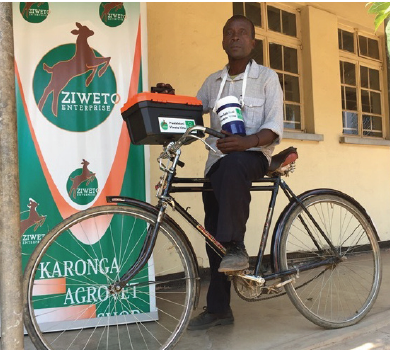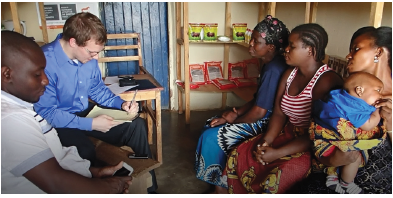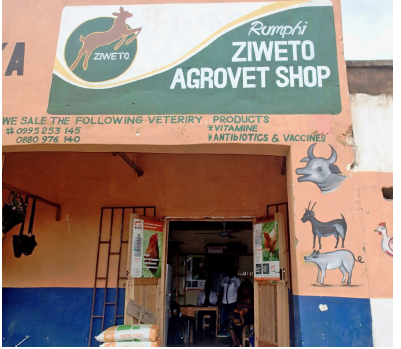download the brief
Key Findings
This case study provides an overview of Ziweto Enterprises, a social venture using franchising methodology to scale its growth. The goal of this study is to present a clear picture of how the starting stages of a social franchise can expand and thrive in a developing country such as Malawi. By discussing Ziweto’s history, business model, operations, challenges, successes, decision-making process, social impact, and projected future, this case study aims to provide insight into the application of business format franchising to address social problems.
Founded by Malawian Victor Mhango, Ziweto Agrovet Shops are “one-stop” franchised shops run by recent graduates of veterinary medicine and agricultural colleges. These shops provide diverse veterinary and agricultural products and services. Ziweto’s products and services provide key support to the nation’s smallholder farmers, supporting animal husbandry as well as crop output. Ziweto’s goal is to improve animal productivity, which in turn can increase a household’s resiliency to food insecurity. Local communities are also enhanced through the additional jobs produced by the franchises. Ancillary benefits include other business sectors services becoming available in local economies where Ziweto Agrovet shops open (Ziweto Enterprises 2016).
By replicating the concept across Malawi, and deploying mobile units in the form of micro-franchisees, or “lead farmers,” on bicycles, this hub-and-spoke business format franchise model has the opportunity to change the future of smallholder farmers, and all residents across the country.

Ziweto’s lead farmers visit farms on bicycles marketing products and giving technical support.
Context
Eighty percent of Malawians are employed through agriculture (Ziweto Enterprises 2016), and livestock typically comprises most of their tangible assets. For smallholder farmers, livestock health is essential to not just economic productivity, but for survival of many families. Unfortunately, livestock are frequently dying from diseases that could be avoided through vaccines and treatments readily available in the developed world. Given their dependence on their livestock, a simple, preventable virus can leave entire extended families without access to food.
The risks of food insecurity affect the welfare and development of the entire country. Child nutrition is a key factor to the productivity, health, and education of a growing population. Almost half of Malawi’s population is fifteen or younger (National Statistical Office 2014). An estimated 60 percent of adults in the labor force were stunted as children due to inadequate food supply, which negatively impacts productivity of workers and adults. Childhood stunting is associated with years repeated in school, which increases the demand on family and the government to provide additional supplies for them to repeat the year. This strains parents, the Malawian government, and the private sector as viable youth are delayed from entering the workforce. On top of that, approximately 23 percent of child mortality is associated with poor nutrition. Child mortality has decreased the current Malawi workforce population by an estimated 10.7 percent. These combined factors have contributed to reduction in Malawi’s GDP by 10.3 percent in 2012 alone (World Food Programme 2015).
While livestock and agriculture are an integral part in Malawi’s development, there is little institutional or private infrastructure for the provision of needed livestock medicine. Malawi moved from a planned economy to a privatized free market in the mid-1990s, and there are still remnants of the old economic system. Malawi’s undesirable economic environment, combined with regulatory issues and underdeveloped physical infrastructure, obstructs the provision of private-market services and products, such as livestock medicine, which the government previously provided.
Humble Beginnings
Victor Mhango founded Ziweto in 2014 after working for the nonprofit organizations Heifer International and Land O’Lakes International Development. He observed that, though the crop farming aspects of the agricultural sector in Malawi were supported by non-governmental organizations and the government, the livestock sector was not getting adequate aid and economic support. Smallholder farmers were losing entire herds of cows and chickens—their only means of survival in some cases to entirely, and affordably, preventable diseases. This is simply due to their lack of access to vaccines and de-wormers.
Simultaneously, Mhango watched the youth in his country struggle to find employment, even after completing their education. They abandoned their family farms in the rural areas to search for work in the urban areas of Blantyre or Lilongwe. Malawi’s unemployment crisis has resulted in over 70 percent of youth aged 15–29 working in the informal sector (International Labour Organization 2013), and about 70 percent of the total population living off less than $2 per day as of 2010 (The World Bank 2017). By providing entrepreneurship opportunities to young veterinary and agriculture graduates within his home country, while increasing the capabilities of smallholder farmers, Ziweto is contributing to increasing Malawi’s economic productivity from both sides.
With a dual commitment to building a sustainable livestock veterinary services company and providing viable employment options for young Malawians, Mhango and his business partner, Byton Simwela, who now serves as the Chief Operations Officer, founded Ziweto Enterprises Limited, which runs franchised veterinary service shops branded as Ziweto Agrovet Shops.

UNH student Abraham DeMaio interviews farmers with Ziweto co-founder Byton Simwela.
An Innovative Structure
Ziweto Enterprises operates with a central office overseeing all distribution, marketing, and management activities of the franchise system. This office is in Lilongwe, the capital of Malawi. As of fall 2017, there are six Ziweto Agrovet franchises (shops), up from three in 2016. The shops are each located in a different district in five northern and one central region of Malawi. For each shop, a young Malawian graduate with a background in agriculture is the franchisee, acting as owner-operator and triaging livestock care. Depending on the level of profitability for each shop, there may also be additional employees. The shops coordinate with Ziweto’s central office and distribution centers to tailor their offerings to their individual markets, but the branding and services remain uniform through the small franchise network.
Ziweto seeks to establish shops all over Malawi and provides microfinancing for franchisees in the beginning of their franchise ownership. The relationship between franchisees and the franchisor (Ziweto corporate) is long-term, due to the investment of time, inventory, and money needed to help kickstart a franchise. Maintaining brand integrity is important to the success of the franchises across districts. As in commercial franchising, brand recognition and reputation are key drivers of sales. A franchise’s brand is a signal to the community of the quality of products and services rendered by the business.
To promote the brand and reach rural customers, lead farmers (micro-franchisees) employed by the franchises ride bicycles and speak directly to farmers in the outskirts of the country. Education about the benefits of veterinary products and services accomplishes two goals: First, creating awareness that the diseases affecting their livestock are preventable in turn increases potential utility and productivity for the farmers. Next, it serves as marketing for Ziweto, creating value in a new market. Finally, the lead farmers are equipped with veterinary products and trained to administer them, providing a mobile service and sales outfit.
The lead farmers, combined with central distribution and franchise retail locations, create a multidimensional hub-and-spoke model that reaches a variety of geographic locations within the country at the last mile of distribution.
A Challenging Context Requires Ongoing Adaptation
As Ziweto is primarily serving “bottom-of-the-pyramid” customers, improving sales and profitability is a constant effort. Even once customers are educated about the value of Ziweto’s products and services, the prices are often too high for smallholder subsistence farmers to afford. However, the prices often do not provide enough margin to ensure profitability for the franchisee. As it stands, no Ziweto franchisee has achieved financial independence. The initial business plan estimated an eighteen-month period of dependence on corporate subsidy for each franchisee. Ziweto has since updated this to approximately three years, which has implications for the capital needed by Ziweto to build its franchise network.
To address profitability challenges, Ziweto has engaged in efforts to shorten the supply chain for imported products and therefore reduce the cost of goods from third-party sellers. Ziweto is also working on increasing diversity of products available in the shops by introducing crop seeds and farm tools among other products. Disintermediating (eliminating intermediaries in the supply chain) can avoid additional markups, therefore resulting in lower costs of goods sold, and a more affordable price level for farmers. Ziweto is also achieving this price control through business agreements with suppliers in Europe (Netherlands), India and East Africa (Tanzania and Kenya).

The Ziweto Agrovet shop in Rumphi in the Northern Region of Malawi.
Responding to Strategic Partnerships and Opportunities
Ziweto is working to vertically integrate, bringing more of the supply chain under its control through a series of partnerships and acquisitions. In January 2017, the company initiated efforts to acquire Alfa Medic, a livestock veterinary store located in the city of Mzuzu, in the northern region of Malawi, with a $75,000 investment from Fledge LLC, a Seattle-based, social-enterprise accelerator. Alfa Medic is the only business in Malawi that offers Kepro veterinary products, a high-quality, Dutch-made product line. Through this acquisition, Ziweto is now the sole distributer in Malawi of Kepro veterinary products. In-house production of certain products such as chicken vaccines will also aid in lowering Ziweto’s costs of goods sold and being able to offer a more affordable price range for customers.
Additionally, Ziweto obtained significant strategic growth support from Connect to Grow, an accelerator program funded by the United Kingdom’s Department for International Development. Connect to Grow matches complementary enterprises in South Asia or Sub-Saharan Africa to those in India, with the goals of catalyzing expansion for both, and improving health, agriculture, and well-being globally. Through this program, Ziweto has developed relationships with Indian companies looking to reach new markets. By seeking out new products, alternative distribution methodologies, and emergent biotechnologies, Ziweto can expand their offerings, better meet the needs of their customers, and lower costs, which both broadens their market and the profitability of their franchises and micro-franchises.
Looking Forward
Moving forward, Mhango envisions another approach to improving profitability—expanding Ziweto’s offerings to capture a wider market. He hopes to eventually develop three Ziweto-branded business lines: animal health care, meat processing, and pharmaceutical production. In addition to broadening their market and available goods and services, Mhango continues to capitalize on manufacturing and distribution inadequacies by internalizing production and becoming the exclusive distributer of high-quality products in Malawi.
Thus far, Ziweto’s innovative model is currently only reaching a small fraction of the potential customers in the country, and Mhango has a bold plan to open twenty-one shops by 2018. This would require an additional $200,000 in funding (Ziweto Enterprises 2016), so the company is dedicated to sourcing new capital and partnership opportunities. Ultimately, the company hopes to have franchised Ziweto shops across all three regions in Malawi.
Mhango and his partner, Simwela, have created the only franchise-based veterinary products and services company in Malawi, and thus face little direct competition. Building a sustainable franchise network in a country with extremes of poverty, climate change-induced drought, and severe infrastructure inadequacies will present Ziweto with enormous challenges as they work to scale up operations. By building strategic partnerships and taking advantage of opportunities to increase skills, and expand and strengthen networks, Mhango and Simwela have been able to access resources and leverage connections far beyond Malawi’s borders. With its commitment to achieving multiple bottom lines, Ziweto serves as a unique model of social business that has the capacity and promise to save lives, increase food security, and create livable jobs for thousands of Malawians.
Methodology
This case study was developed over the period of nine months in fall 2016–spring 2017. It includes data from working sessions with company leaders, regular mentor-mentee phone calls, as well field research conducted in January 2017 with site visits to Ziweto locations across Malawi. During the field research, in-depth interviews were conducted with franchise owners, store managers, lead farmers, and Ziweto staff and customers. Field data were supplemented with company-provided documents and secondary data.
Box 1: About This Case Study
This case study was examined as part of the Social Sector Franchise Initiative, a project of the Center for Social Innovation and Enterprise (CSIE).
The CSIE is a joint venture of the Peter T. Paul College of Business and Economics and the Carsey School of Public Policy, both at the University of New Hampshire (UNH). The CSIE also collaborates closely on this initiative with the International Franchise Association (IFA), as well as the Peter T. Paul College of Business & Economics’ Rosenberg International Franchise Center, which is a respected authority on business format franchising.
The IFA NextGen competition is an annual business franchise contest that awards successful applicants with a week-long visit to the IFA’s annual convention in the United States. Through association with the IFA NextGen program, growing Social Sector Franchises are selected to participate in UNH’s Social Sector Franchise Accelerator (SSFA).
The nine-month SSFA is a key part of the Social Sector Franchise Initiative (SSFI), where nascent social sector franchises are selected from a pool of applicants. Accelerator participants are provided with coordinated intensive mentorship by commercial franchise experts from the IFA, online learning, and an ecosystem of support. The process includes an active learning and research component conducted and documented by UNH faculty and students, culminating in this case study report.
The SSFI aims to help contribute to the growing field of social sector franchising by providing applied research and information on social sector franchising mechanisms to help inform success for practicing social sector franchise leaders, non-governmental organizations, investors, donors, and government officials.
References
Alon, Ilan. Social Franchising. New York: Palgrave Macmillan, 2014.
EPA. Agriculture Sectors. February 14, 2017. https://www.epa.gov/regulatory-information-sector/agriculture-sectors (accessed May 13, 2017).
Food and Agriculture Organization. The State of Food and Agriculture: Climate Change, Agriculture, and Food Security. Rome: United Nations, 2016.
International Labour Organization. Global Employment Trends for Youth, 2013: A Generation at Risk. 2013. http://www.ilo.org/wcmsp5/groups/public/@dgreports/@dcomm/documents/publication/wcms_212423.pdf (accessed October 12, 2017).
Investopedia. Microfinance. n.d. http://www.investopedia.com/terms/m/microfinance.asp (accessed May 31, 2017).
The Commissioner of Statistics. Integrated Household Panel Survey 2010–2013. Zomba: National Statistical Office, 2014.
The Economist. Malawi’s “Cashgate” Scandal. February 27th, 2014. http://www.economist.com/blogs/baobab/2014/02/malawi-s-cashgate-scandal (accessed May 18th , 2017).
The World Bank. Poverty and Equity: Malawi. 2017. http://povertydata.worldbank.org/poverty/country/MWI (accessed October 12, 2017).
Thorton, Philip K. “Livestock production: recent trends, future prospects.” Philosophical Transactions of the Royal Society B: Biological Sciences, 2010.
World Food Programme. The Cost of Hunger in Malawi. UN Economic Commission for Africa, 2013.
World Trade Organization. Trade Policy Review-Report by the Secretariat-Malawi. Geneva: World Trade Organization, 2016.
Ziweto Enterprises. “Business Profile.” Lilongwe, 2016.
Acknowledgements
We are grateful to the funders that have made this work possible, including our lead funder, the Peter T. Paul Innovation Fund at the Peter T. Paul College of Business & Economics at the University of New Hampshire. We also acknowledge support from the International Franchise Association’s Social Sector Task Force, which provided volunteer mentor Lori Kiser Block of The Decide Group, who both served as an integral contributor to the Social Sector Franchise Accelerator and guided Ziweto Agrovet Services throughout the course of this case study. We also thank Ziweto principals Victor Mhango and Byton Simwela for providing extensive access to the company information upon which this case study was based.